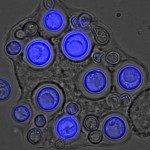Lien vers Pubmed [PMID] – 7814467
J. Clin. Microbiol. 1994 Oct;32(10):2364-71
Cryptococcus neoformans serotype A is responsible for the majority of cryptococcal infections in AIDS patients. In France, approximately 17% of the patients are infected with serotype D, regardless of their human immunodeficiency virus status. In a retrospective study of 273 patients, we found that serotype D was unevenly distributed in France. We wondered if this was related to the yeast’s genetic background. We used karyotyping and DNA fingerprints generated by UT-4p to analyze 40 serotype D clinical isolates. We found an extensive polymorphism, with only two conserved karyotypes from drug-addicted patients living in the same area. Although highly variable, the DNA fingerprints were classified into 10 groups. Four pairs of isolates were identical; three of these pairs were from patients living in the same area, but there was no other correlation with the geographical area. The two isolates with identical karyotypes belonged to the same fingerprint group. Five of the six isolates that made up fingerprint group I were recovered from drug-addicted patients (P < 0.002; chi-square), and all five isolates found in fingerprint group III were from male homosexual patients (P < 0.02). Finally, five of the seven isolates from patients with cryptococcal pneumonia were classified as fingerprint group V (P < 0.04). These results suggest that there are possible relationships between characteristics of the isolates and body localization or even risk factors. Results of the present study warrant other studies on isolates of all serotypes and on isolates from clinical and environmental sources.

